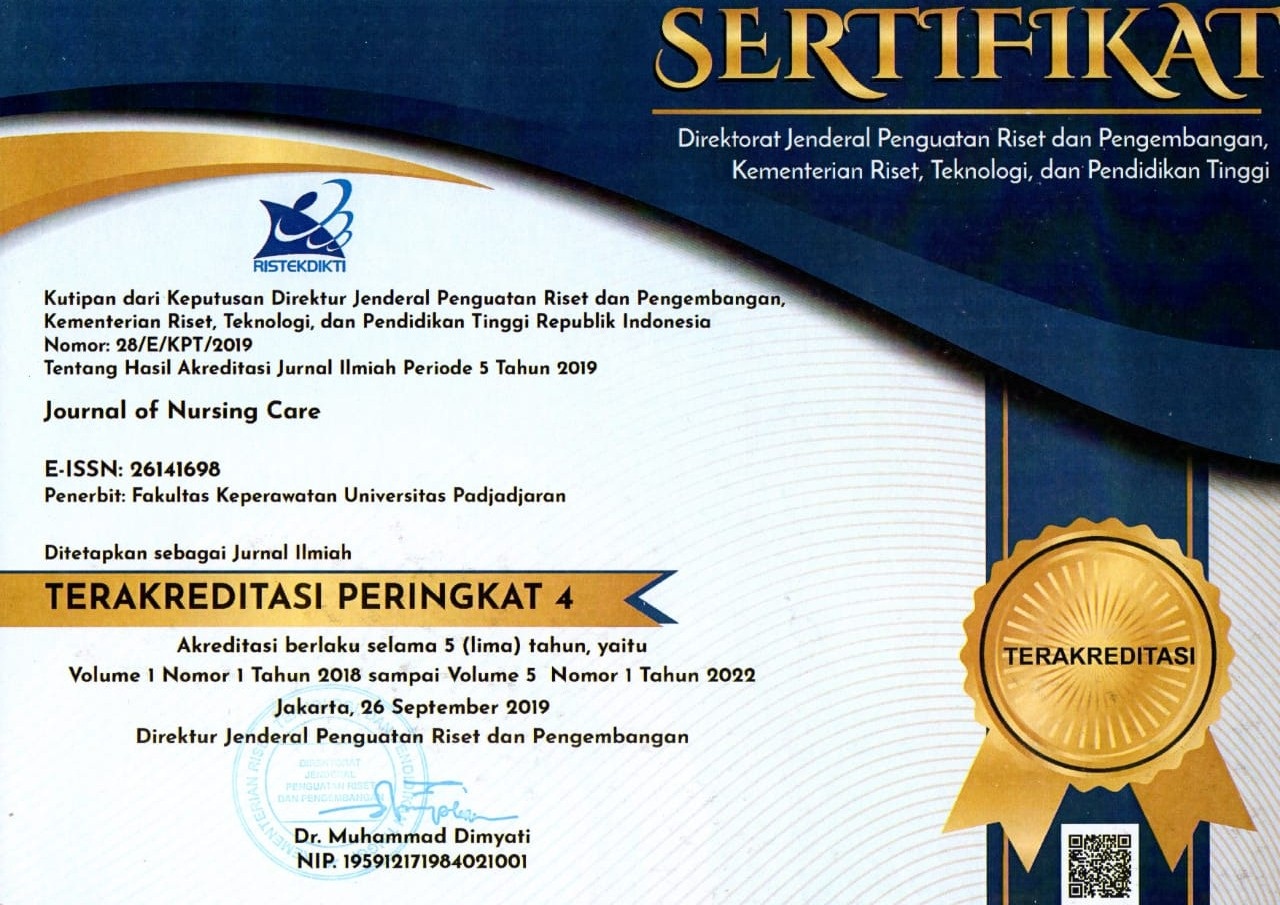Descriptive Study of Optimizing Family Health Functions in Preventing COVID 19 Transmission
Abstract
COVID 19 has become a world health problem, and Indonesia has declared an emergency status for an outbreak. To prevent transmission of COVID 19, the government has set three policies that are increasing the availability and reliability of infrastructure, involving the industrial world and social education. However, COVID 19 transmission still occurs. Preparedness for COVID 19 transmission starts with the family as a minor system in the community. The Healthy Indonesian Program with a Family Approach is considered an excellent effort to carry out health functions to prevent COVID 19 transmission. This study aimed to optimize family functions in preventing COVID 19 transmission. This study used a descriptive-analytic design. Two hundred and fifty-eight samples were recruited using a consecutive sampling technique. To measure family function using a questionnaire. Data were analyzed by descriptive statistics (i.e., frequency statistics). The frequency statistics showed that most of the respondents have optimally performed family functions in the health sector. Most of the respondents understand COVID 19 (88,4%), they are capable of making decisions (96,9%), they can care for the family (88,8%), they can modify the environment (75,2%), and they can take advantage of health services (81%). This study only captures the extent to which the family optimally performs health functions; it does not provide any form of intervention. The results of this study prove that the family has an important role to play in breaking the transmission of COVID 19.
Keywords
Full Text:
PDFReferences
Abubakar, Ali, and Nabila Ulamy Alya. (2020). “Refunction Family during Covid-19 Pandemic (Study among Students of Anthropology UGM).” SAMARAH: Jurnal Hukum Keluarga dan Hukum Islam 4(1): 151.
Chan, Jasper Fuk-woo et al. (2020). “A Familial Cluster of Pneumonia Associated with the 2019 Novel Coronavirus Indicating Person-to-Person Transmission : A Study of a Family Cluster.” The Lancet 395(10223): 514–23.
Chen, N et al. (2020). “Epidemiological and Clinical Characteristics of 99 Cases of 2019 Novel Coronavirus Pneumonia in Wuhan, China: A Descriptive Study.” Lancet 395(February): 507–13.
Fasni, Ahmad. (2020). “Peran Keluarga Cegah Corona.” BKKBN: 1.
Friedman, Bowden, and Jones. (2010). Buku Ajar Keperawatan Keluarga: Riset, Teori Dan Praktik. Jakarta: EGC.
Friedman, M. M, V.R Bowden, and E.G Jones. (2014). Buku Ajar Keperawatan Keluarga (Riset, Teori & Praktik). 5th ed. Jakarta: EGC.
Gadermann, Anne C. et al. (2021). “Examining the Impacts of the COVID-19 Pandemic on Family Mental Health in Canada: Findings from a National Cross-Sectional Study.” BMJ Open 11(1): 1–11.
Hanson, S.M.H. (2010). F.A. Davis. Introduction to Family Health Care Nursing. In S. M. H. Hanson, V. Gedaly-Duff, & J. R. Kaakinen (Eds.), Family Health Care Nursing: Theory, Practice and Research (3rd Ed., Pp. 3–38). Philadelphia.
Hermawan, B. (2020). “Wapres: Pemerintah Keluarkan Tiga Kebijakan Tangani Corona.” News.
Kaakinen, J.R, S.H Hanon, and S.A Denham. (2010). Family Health Care Nursing, Theory Practice and Research 4th Edition: Chapter 1. Philadelphia: F.A DAvis Company.
Kaddi, Sitti Murni, Puji Lestari, and Donal Adrian. (2020). “Komunikasi Keluarga Dalam Pencegahan Coronavirus Disease 2019.” Jurnal Ilmu Komunikasi 18(1): 63–74.
Luthfa, I. (2016). “Family Support Pada Penderita Diabetes Mellitus Tipe 2 Di Puskesmas Bangetayu Semarang, Analisis Rasch Model.” Jurnal Keperawatan dan Pemikiran Ilmiah Nurscope 2(2): 1–12.
Moudy, Jesica, and Rizma Adlia Syakurah. (2020). “Pengetahuan Terkait Usaha Pencegahan Coronavirus Disease.” HIGEIA Journal of Public Health Research and Development 4(3): 333–46.
Murdaningsih, Dwi. (2020). “No TitleEdukasi Protokol Kesehatan Mulaid Ari Keluarga.” Nusantara: 1.
Nugraheni, D.E. (2020). “Masa Darurat Bencana Akibat Virus Corona Diperpanjang Hingga 29 Mei 2020.” Kompas.com.
Nurislaminingsih, Rizki. (2020). “Layanan Pengetahuan Tentang Covid-19 Di Lembaga Informasi.” Jurnal Ilmu Perpustakaan dan Informasi 4(1): 19–37.
Permatasari, Andalusia Neneng, Dinar Nur Inten, and Kelik Nursetiyo WilianiWidiyanto. 2020. “Keintiman Komunikasi Keluarga Saat Social Distancing Pandemi Covid 19.” Jurnal Obsesi : Hurnal Pendidikan Anak Usia Dini 5(1): 346–59.
Purnamasari, Ika, and Anisa Ell Raharyani. (2020). “Tingkat pengetahuan dan perilaku masyarakat kabupaten wonosobo tentang covid-19.” Jurnal Ilmiah Kesehatan 5(Mei): 33–42.
Ramadhana, Maulana Rezi. 2020. “Mempersiapkan Ketahanan Keluarga Selama Adaptasi Kebiasaan Baru Di Masa Pandemi Covid-19.” Jurnal Kependudukan Indonesia 2902: 61.
Vanderhout, Shelley M. et al. 2020. “Family Perspectives of COVID-19 Research.” Research Involvement and Engagement 6(1): 4–6.
WHO. 2020. "Q&A on Coronaviruses (COVID-19). Diakses 20 Maret 2020.
Yunus, Nur Rohim, and Annissa Rezki. 2020. “Kebijakan Pemberlakuan Lockdown Sebagai Antisipasi Penyebaran Corona Virus Covid 19.” Jurnal Sosial dan Budaya Syar’i 7(3): 227–38.
DOI: https://doi.org/10.24198/jnc.v4i2.30944
Refbacks
- There are currently no refbacks.

This work is licensed under a Creative Commons Attribution-ShareAlike 4.0 International License.










Redaksi Journal of Nursing Care:
Fakultas Keperawatan, Universitas Padjadjaran
Jalan Raya Bandung-Sumedang Km. 21 Jatinangor, Sumedang, Indonesia 45363
WA: 085314295890
Tlp. 022-7795596
Email: jnc.fkep@unpad.ac.id

This work is licensed under a Creative Commons Attribution-NonCommercial 4.0 International License


